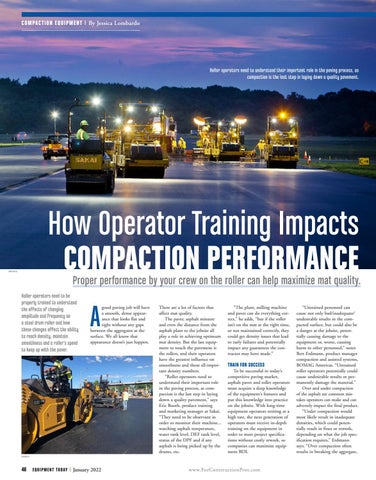C O M PACT I ON E QU I P M E N T | By Jessica Lombardo
Roller operators need to understand their important role in the paving process, as compaction is the last step in laying down a quality pavement.
How Operator Training Impacts COMPACTION PERFORMANCE
SAKAI Americas
Proper performance by your crew on the roller can help maximize mat quality.
Roller operators need to be properly trained to understand the effects of changing amplitude and frequency on a steel drum roller and how these changes affect the ability to reach density, maintain smoothness and a roller’s speed to keep up with the paver.
A
good paving job will have a smooth, dense appearance that looks flat and tight without any gaps between the aggregates at the surface. We all know that appearance doesn’t just happen.
There are a lot of factors that affect mat quality. The paver, asphalt mixture and even the distance from the asphalt plant to the jobsite all play a role in achieving optimum mat density. But the last equipment to touch the pavement is the rollers, and their operators have the greatest influence on smoothness and those all-important density numbers. “Roller operators need to understand their important role in the paving process, as compaction is the last step in laying down a quality pavement,” says Eric Booth, product training and marketing manager at Sakai. “They need to be observant in order to monitor their machine... watching asphalt temperature, water tank level, DEF tank level, status of the DPF and if any asphalt is being picked up by the drums, etc.
“The plant, milling machine and paver can do everything correct,” he adds, “but if the roller isn’t on the mat at the right time, or not maintained correctly, they could get density issues that lead to early failures and potentially impact any guarantees the contractor may have made.”
TRAIN FOR SUCCESS To be successful in today’s competitive paving market, asphalt paver and roller operators must acquire a deep knowledge of the equipment’s features and put this knowledge into practice on the jobsite. With long-time equipment operators retiring at a high rate, the next generation of operators must receive in-depth training on the equipment in order to meet project specifications without costly rework, so companies can maximize equipment ROI.
Caterpillar, Inc.
46 EQUIPMEN T TODAY | January 2022
www.ForConstructionPros.com
“Untrained personnel can cause not only bad/inadequate/ undesirable results in the compacted surface, but could also be a danger at the jobsite, potentially causing damage to the equipment or, worse, causing harm to other personnel,” notes Bert Erdmann, product manager compaction and assisted systems, BOMAG Americas. “Untrained roller operators potentially could cause undesirable results or permanently damage the material.” Over and under compaction of the asphalt are common mistakes operators can make and can adversely impact the final product. “Under compaction would most likely result in inadequate densities, which could potentially result in fines or rework, depending on what the job specification requires,” Erdmann says. “Over compaction often results in breaking the aggregate,




